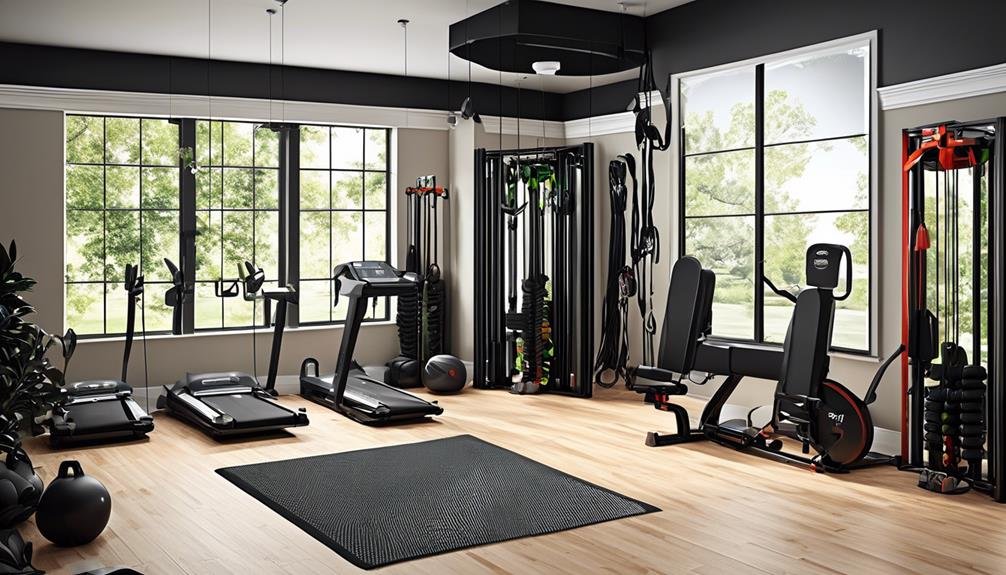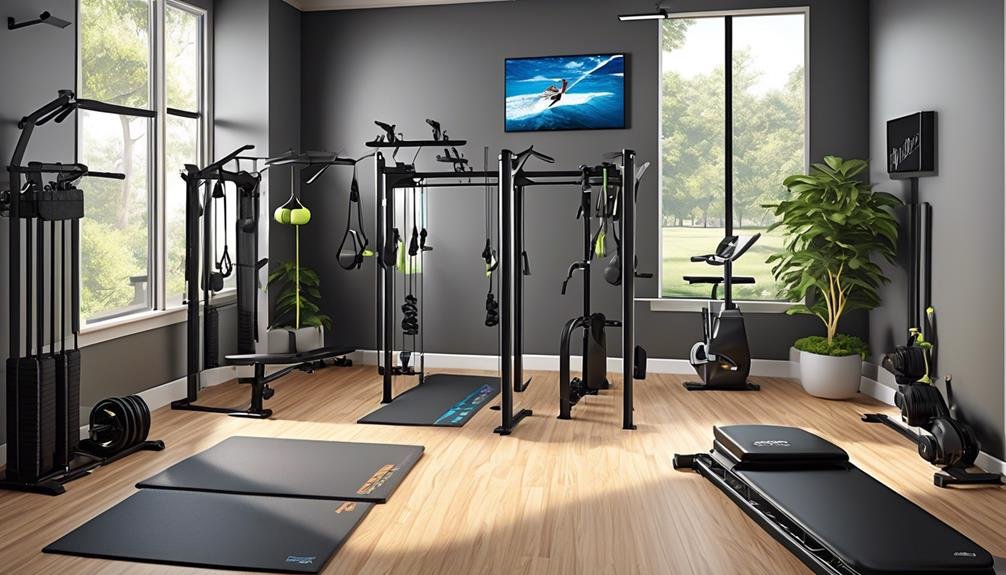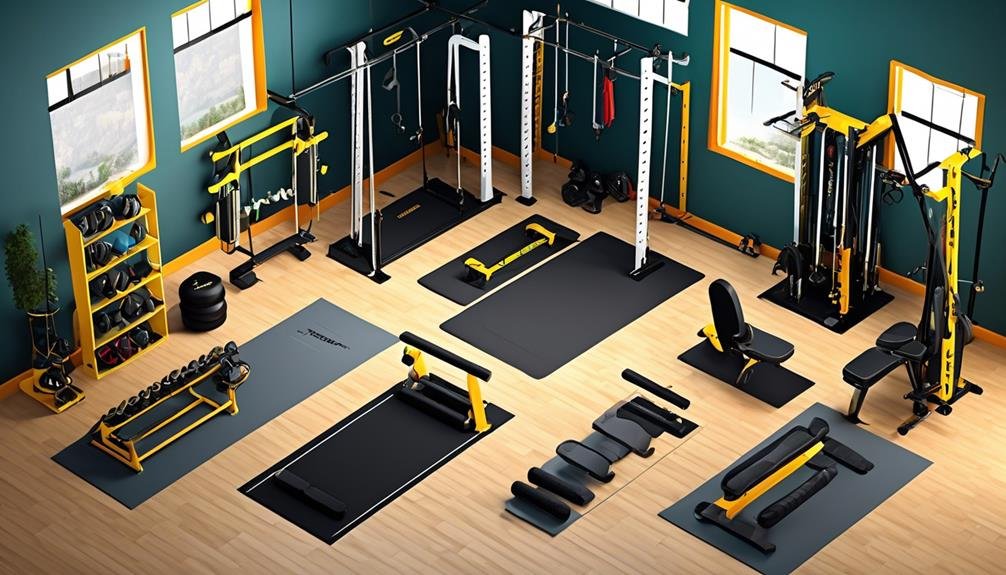Are you tired of constantly tripping over cords from your workout equipment?
Imagine this: you're in the middle of an intense exercise routine, fully focused and in the zone, when suddenly you stumble and lose your balance due to a tangled mess of cords. Frustrating, right?
Well, worry not! In this discussion, we will explore effective strategies to prevent tripping hazards caused by workout equipment cords. By implementing these techniques, you can ensure a safer and more enjoyable workout experience.
So, let's dive in and discover how you can keep those cords organized and out of harm's way.
Key Takeaways
- Use cable protectors and cord covers to prevent tripping hazards from workout equipment cords.
- Secure cords to walls or equipment with hooks or clips to keep them neat and organized.
- Consider the appropriate size, length, and weight capacity of cable protectors for your equipment cords.
- Regularly inspect cords for damage and replace them if necessary to maintain safety in the workout space.
Cord Organization Techniques
To ensure a safe and clutter-free workout space, implement effective cord organization techniques.
One of the most important steps you can take is to use cable protectors. These are devices designed to cover and protect cords, preventing them from becoming trip hazards. Cable protectors come in different sizes and materials, so be sure to choose ones that are appropriate for the cords you have.
Another useful tool for cord organization is a cord cover. This is a flexible tube that can hold multiple cords together, keeping them neat and out of the way. Cord covers are easy to install and can be cut to the desired length. When using cord covers, make sure to position them in areas where they won't cause additional tripping hazards.
Additionally, consider using hooks or clips to secure cords to walls or equipment. This will prevent them from hanging loosely and getting in the way.
Cord Management Solutions
Create an organized and hazard-free workout space by exploring effective cord management solutions. Proper management of cables can prevent tripping hazards and ensure a smooth flow of traffic in your workout area. Here are some cord management solutions to consider:
- Cable covers: Use cable covers to conceal and protect your cords. These covers are designed to lay flat on the ground, preventing tripping accidents while keeping your cables tidy and organized.
- Cord clips: Attach cord clips to the walls or furniture to secure the cables in place. This not only prevents them from getting tangled but also keeps them out of the way, reducing the risk of tripping.
- Cable management sleeves: These flexible sleeves are designed to bundle and hide multiple cables together. They provide a clean and organized appearance while keeping the cords safely out of sight.
- Cord winders: Use cord winders to neatly coil and store excess cable length. By keeping the cords compact and contained, you can minimize the chances of tripping over loose cables.
Cable Protectors for Workout Equipment

Cable protectors are essential for workout equipment to prevent tripping hazards and ensure the safety of your workout space. These protectors are specifically designed to safeguard your cords and wires from being crushed or damaged during intense workouts. Made from flexible and durable PVC material, cable protectors provide long-lasting protection for your equipment cords. They come in various lengths to accommodate different workout spaces and equipment arrangements.
By using cable protectors, you can prevent trip accidents that can result from loose cords and wires. These protectors not only enhance safety but also improve the overall aesthetics of your workout area. They effectively conceal and organize your equipment cords, giving your space a more streamlined and professional look.
When choosing cable protectors for your workout equipment, ensure that you select the appropriate size and length to fit your specific setup. Look for protectors that are easy to install and remove, allowing you to rearrange your equipment as needed. Additionally, consider the weight capacity of the cable protectors to ensure they can handle the load of your equipment cords.
Investing in cable protectors is a simple yet effective way to prevent tripping hazards and maintain a safe workout environment. By properly protecting your cords, you can focus on your fitness routine without worrying about accidents or damage to your equipment.
Tips to Prevent Tripping Hazards
Need some tips to prevent tripping hazards in your workout space?
It's important to take safety measures to ensure a safe environment, especially in areas with high traffic. One effective way to prevent tripping hazards is by using cable covers. These protectors not only keep wires and cables out of the way but also reduce the risk of accidents. When choosing a cable cover, make sure to consider whether it will be used indoors or outdoors, as different applications require different types of protectors.
In addition to using cable covers, organizing cords, wires, and cables with cable management solutions is crucial. This helps keep them neatly tucked away and prevents them from becoming potential tripping hazards.
Another important step is to create safe pathways by marking walkways and ensuring sufficient lighting. This makes it easier for people to navigate the area without accidentally tripping over any equipment cords.
It's also essential to promote safety awareness among everyone using the workout space. Encourage individuals to be mindful of their surroundings and to report any potential hazards they come across.
Importance of Proper Cord Placement

To ensure a safe workout environment and prevent tripping hazards, it's crucial to properly place and secure cords and cables in your workout space. Proper cord placement not only helps protect outdoor cables from damage, but also ensures efficient cable management and reduces the risk of accidents.
One important aspect of cord placement is to keep them away from high traffic areas. Placing cords along walls or under equipment can help keep them out of the way and minimize the chances of tripping. Additionally, securing cords with heavy-duty clips or ties can keep them organized and prevent them from becoming a hazard during exercise.
Regularly inspecting cords for damage is also essential. Frayed or worn-out cords should be replaced immediately to prevent accidents. It's recommended to use heavy-duty cords that are designed to withstand the demanding conditions of a workout environment.
Creating clear pathways is another effective strategy to avoid tripping over cords. Marking these pathways using floor tape or mats can further enhance safety and help individuals navigate around the workout area without any obstacles.
Creating a Safer Workout Space
Secure your workout space and minimize the risk of accidents by implementing specific measures to create a safer environment. One effective way to prevent tripping hazards from workout equipment cords is to use cable covers. These covers are designed to protect power cords and prevent them from becoming tangled or causing accidents. By covering the cords, you create a smooth and safe surface for walking or exercising.
When choosing cable covers, look for ones that are durable and designed specifically for high-traffic areas. They should be able to withstand the weight of equipment and foot traffic without becoming damaged. Additionally, opt for covers that are easy to install and remove, as this will make it more convenient for you to adjust your workout space as needed.
Before installing the cable covers, make sure to properly organize and secure the power cords. Keep them away from walkways and ensure they aren't hanging loosely where they can be tripped over. Use clips or ties to secure the cords to walls or equipment to keep them out of the way. Additionally, consider using cord management solutions, such as cable trays or cord organizers, to keep the cords neat and organized.
Frequently Asked Questions
How Do You Prevent Tripping on Cords?
To prevent tripping on cords, make sure to keep them secured and organized. Use cable protectors to cover and reduce the risk of accidents. Additionally, consider using cable management solutions to keep cords in place and promote a safe environment.
How Do I Stop My Cords From Tripping?
To stop cords from tripping, secure them with cable protectors and organize them with management solutions. Mark walkways, keep floors clean, and provide good lighting to ensure safe pathways.
What Is the Best Way of Preventing an Electrical Cable Becoming a Trip Hazard?
To prevent electrical cable tripping hazards, keep cords organized and out of the way using cable management solutions. Be mindful of safe pathways by marking walkways, ensuring proper lighting, and promoting safety awareness.
Does Taping Down Cable Prevent Tripping Hazards?
Taping down cables may help prevent tripping hazards, but it is not the most effective solution. Consider using cable protectors instead, which provide better protection against accidents and improve room aesthetics.
Conclusion
In conclusion, preventing tripping hazards from workout equipment cords is crucial for maintaining a safe workout space.
By using cable protectors, organizing cords with management solutions, and creating safe pathways, you can significantly reduce the risk of accidents.
Remember to keep cords out of the way, ensure proper placement, and maintain a clean and well-lit environment.
Taking these steps won't only enhance room aesthetics but also promote a safer and more enjoyable workout experience.





